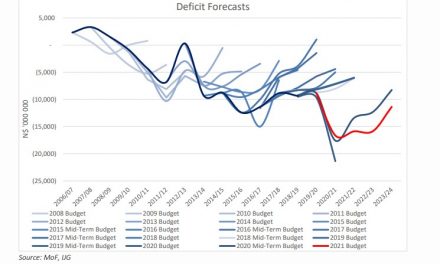
Schlettwein gets N$250 million more for his ministerial kitty
Minister of Trade and Industry Hon. Calle Schlettwein presented his ministerial budget to the National Assembly on Tuesday. The total budget allocation to the Ministry of Trade and Industry for the financial year 2014/2015 amounts to just over N$1 billion, a 33.5% increase from the 2013/2014 allocations. Schlettwein’s ministry will now effectively have N$250 million more to use in the current financial year.
Presenting his ministry’s budget to the House, the minister said “for the year under review, the Ministry of Trade and Industry will focus its efforts on five major projects namely trade promotion, industrial and business development, investment promotion, supervision and support services, and a newly added component, the special industrialization initiative.
“The ministry will focus on improving the efficiency and effectiveness in the registration of companies, close corporations and intellectual property rights and the functioning of the internal market. Plans are also in place to draft a policy and legal framework for rights-based consumer protection while providing financial support to strengthen the functional capacities of the Namibia Competition Commission and the Namibian Standards Institution.”
The trade minister said his ministry will work closely with the Ministries of Finance and Home Affairs and Immigration towards implementing the one-stop-border post and single-window concepts to facilitate foreign direct investment and trade at border posts.
On immediate strategic initiatives Schlettwein said the Ministry of Trade and Industry will establish the Namibia International Trade Management Commission (Namibia Board of Trade). “We shall finalise the legal frame work for the establishment of the Namibia Board of Trade, which shall inter alia deal with issues of tariff setting, import and export permits, rebates and draw-downs, infant industry protection and support measures, unfair trade practices, safeguards, anti-dumping measures and Rules of Origin and move towards finalizing the legal framework for the establishment of the Namibia Industrial Development Agency (NIDA).”
Referring to legislative changes, he said the Foreign Investment Act of 1990 will be replaced by a revised Investment Law to provide for the role of the state, the reservation of certain catagories of business and sectors for domestic investors and it will lay the foundation for the construction of a one stop shop [for investors}.
Said Schlettwein, “Our task to grow the economy and improve living standards of our people is possible through industrialization which itself is within our means to accomplish. It is only through beneficiation and adding value to our own resources and creating the value chains that derive from them that we will be able to diversify our economy and strengthen our competitiveness and create job opportunities and wealth.”












































